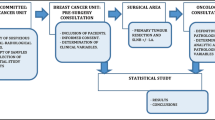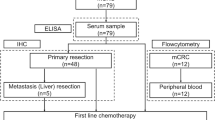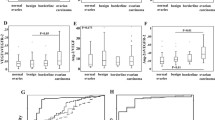Abstract
Background
Lymph node metastasis is the most important factor to consider when deciding on the modality of resection in patients with early gastric cancer. The aim of the present study was to assess the relationship between preoperative serum angiopoietin-2, a lymphangiogenic growth factor, and lymph node metastasis in patients with early gastric cancer.
Methods
A total of 62 preoperative serum samples from patients diagnosed with early gastric adenocarcinoma, and 30 serum samples from healthy donors were obtained. The serum levels of angiopoietin-2 (Ang-2) were quantified by immunoassay. Intra- and peritumor lymphatic vessel density (I-LVD and P-LVD) were counted after immunohistochemical staining. The relationship between the serum Ang-2 levels and other prognostic variables (tumor size, histological type, depth of tumor invasion, I-LDV, P-LDV, presence of lymph node involvement, and distant metastasis) were then examined by univariate and multivariate linear regression analyses.
Results
The median serum levels of Ang-2 in patients were higher than those of healthy controls [311.1 ng/mL, interquartile range (IQR) 256.7–311.1 ng/mL versus 286.5 ng/mL, IQR 226.9–286.5 ng/mL; Mann–Whitney test, P = 0.016]. Eight patients had metastatic lymph nodes; the Ang-2 levels from the patients with metastatic lymph nodes were higher than from those with negative lymph nodes (297.5 ng/mL, IQR 251.1–385.8 ng/mL versus 416.0 ng/mL, IQR 337.1–485.5 ng/mL; Mann–Whitney test, P = 0.019). Elevated serum Ang-2 levels were associated with positive lymph node involvement and this finding was significant on univariate (P = 0.008) and multivariate logistic regression analysis (P = 0.011).
Conclusion
Serum Ang-2 levels were clinically useful markers for lymph node metastasis in patients with early gastric cancer.




Similar content being viewed by others
References
Shin HR, Jung KW, Won YJ. National Cancer Incidence for the Year 2002 in Korea. Ann Surg Oncol. 2007;39:139–49.
Kitano S, Shiraishi N, Uyama I, Sugihara K, Tanigawa N. A multicenter study on oncologic outcome of laparoscopic gastrectomy for early cancer in Japan. Ann Surg. 2007;245:68–72.
Lee JH, Kim YW, Ryu KW, Lee JR, Kim CG, Choi IJ, et al. A phase-II clinical trial of laparoscopy-assisted distal gastrectomy with D2 lymph node dissection for gastric cancer patients. Ann Surg Oncol. 2007;14:3148–53.
Korean Gastric Cancer Association. 2004 Nationwide Gastric Cancer Report in Korea. J Korean Gastric Cancer Assoc. 2007;7:47–54.
Nozaki I, Kubo Y, Kurita A, Tanada M, Yokoyama N, Takiyama W, et al. Long-term outcome after laparoscopic wedge resection for early gastric cancer. Surg Endosc. 2008.
Soetikno R, Kaltenbach T, Yeh R, Gotoda T. Endoscopic mucosal resection for early cancers of the upper gastrointestinal tract. J Clin Oncol. 2005;23:4490–98.
Ryu KW, Choi IJ, Doh YW, Kook MC, Kim CG, Park HJ, et al. Surgical indication for non-curative endoscopic resection in early gastric cancer. Ann Surg Oncol. 2007;14:3428–34.
Lee JH, Ryu KW, Kook MC, Lee JY, Kim CG, Choi IJ, et al. Feasibility of laparoscopic sentinel basin dissection for limited resection in early gastric cancer. J Surg Oncol. 2008.
Park SR, Lee JS, Kim CG, Kim HK, Kook MC, Kim YW, et al. Endoscopic ultrasound and computed tomography in restaging and predicting prognosis after neoadjuvant chemotherapy in patients with locally advanced gastric cancer. Cancer. 2008;112:2368–76.
Kim JP, Hur YS, Yang HK. Lymph node metastasis as a significant prognostic factor in early gastric cancer: analysis of 1,136 early gastric cancers. Ann Surg Oncol. 1995;2:308–13.
Siewert JR, Bottcher K, Stein HJ, Roder JD. Relevant prognostic factors in gastric cancer: ten-year results of the German Gastric Cancer Study. Ann Surg. 1998;228:449–61.
Park JH, Park KJ, Kim YS, Sheen SS, Lee KS, Lee HN, et al. Serum angiopoietin-2 as a clinical marker for lung cancer. Chest. 2007;132:200–6.
Sun XD, Liu XE, Wu JM, Cai XJ, Mou YP, Li JD. Expression and significance of angiopoietin-2 in gastric cancer. World J Gastroenterol. 2004;10:1382–5.
Zhang L, Yang N, Park JW, Katsaros D, Fracchioli S, Cao G, et al. Tumor-derived vascular endothelial growth factor up-regulates angiopoietin-2 in host endothelium and destabilizes host vasculature, supporting angiogenesis in ovarian cancer. Cancer Res. 2003;63:3403–12.
Ahmad SA, Liu W, Jung YD, Fan F, Reinmuth N, Bucana CD, et al. Differential expression of angiopoietin-1 and angiopoietin-2 in colon carcinoma. A possible mechanism for the initiation of angiogenesis. Cancer. 2001;92:1138–43.
Etoh T, Inoue H, Tanaka S, Barnard GF, Kitano S, Mori M. Angiopoietin-2 is related to tumor angiogenesis in gastric carcinoma: possible in vivo regulation via induction of proteases. Cancer Res. 2001;61:2145–53.
Maisonpierre PC, Suri C, Jones PF, Bartunkova S, Wiegand SJ, Radziejewski C, et al. Angiopoietin-2, a natural antagonist for Tie2 that disrupts in vivo angiogenesis. Science. 1997;277:55–60.
Davis S, Aldrich TH, Jones PF, Acheson A, Compton DL, Jain V, et al. Isolation of angiopoietin-1, a ligand for the TIE2 receptor, by secretion-trap expression cloning. Cell. 1996;87:1161–69.
Gale NW, Thurston G, Hackett SF, Renard R, Wang Q, McClain J, et al. Angiopoietin-2 is required for postnatal angiogenesis and lymphatic patterning, and only the latter role is rescued by Angiopoietin-1. Dev Cell. 2002;3:411–23.
Sobin L, Wittenkind C. International Union against Cancer (UICC) TNM classification of malignant tumours 5th ed. New York: Wiley-Liss; 1997. p. 59–62.
Niedzwiecki S, Stepien T, Kopec K, Kuzdak K, Komorowski J, Krupinski R, et al. Angiopoietin 1 (Ang-1), angiopoietin 2 (Ang-2) and Tie-2 (a receptor tyrosine kinase) concentrations in peripheral blood of patients with thyroid cancers. Cytokine. 2006;36:291–5.
Vart RJ, Nikitenko LL, Lagos D, Trotter MW, Cannon M, Bourboulia D, et al. Kaposi’s sarcoma-associated herpesvirus-encoded interleukin-6 and G-protein-coupled receptor regulate angiopoietin-2 expression in lymphatic endothelial cells. Cancer Res. 2007;67:4042–51.
Currie MJ, Gunningham SP, Han C, Scott PA, Robinson BA, Harris AL, et al. Angiopoietin-1 is inversely related to thymidine phosphorylase expression in human breast cancer, indicating a role in vascular remodeling. Clin Cancer Res. 2001;7:918–27.
An JY, Baik YH, Choi MG, Noh JH, Sohn TS, Kim S. Predictive factors for lymph node metastasis in early gastric cancer with submucosal invasion: analysis of a single institutional experience. Ann Surg. 2007;246:749–53.
Li C, Kim S, Lai JF, Oh SJ, Hyung WJ, Choi WH, et al. Risk factors for lymph node metastasis in undifferentiated early gastric cancer. Ann Surg Oncol. 2008;15:764–9.
Longatto-Filho A, Pinheiro C, Ferreira L, Scapulatempo C, Alves VA, Baltazar F, et al. Peritumoural, but not intratumoural, lymphatic vessel density and invasion correlate with colorectal carcinoma poor-outcome markers. Virchows Arch. 2008;452:133–8.
Rubbia-Brandt L, Terris B, Giostra E, Dousset B, Morel P, Pepper MS. Lymphatic vessel density and vascular endothelial growth factor-C expression correlate with malignant behavior in human pancreatic endocrine tumors. Clin Cancer Res. 2004;10:6919–28.
Acknowledgment
The authors were supported in part by grants no. NCC 0710411-2 and NCC 0710340 from National Cancer Center, Korea.
Author information
Authors and Affiliations
Corresponding author
Rights and permissions
About this article
Cite this article
Jo, M.J., Lee, J.H., Nam, BH. et al. Preoperative Serum Angiopoietin-2 Levels Correlate with Lymph Node Status in Patients with Early Gastric Cancer. Ann Surg Oncol 16, 2052–2057 (2009). https://doi.org/10.1245/s10434-009-0474-9
Received:
Accepted:
Published:
Issue Date:
DOI: https://doi.org/10.1245/s10434-009-0474-9




